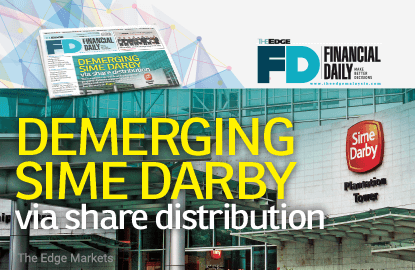
KUALA LUMPUR: Sime Darby Bhd has decided to spin off its plantation and property businesses by listing the two units separately on Bursa Malaysia through share distribution to existing shareholders.
The listing exercises of the two units, Sime Darby Plantation Bhd and Sime Darby Property Bhd, which the group targets to take place by early next year, will not involve issuance of new shares for sale to raise fresh capital.
“Sime Darby’s holdings in Sime Darby Plantation and Sime Darby Property will be distributed to shareholders of Sime Darby, according to their respective shareholding proportions,” explained its president and group chief executive Tan Sri Mohd Bakke Salleh at the financial results briefing yesterday.
Upon completion of the exercises, Sime Darby will house the industrial, motors, logistics businesses and others. It will not own any equity stake in Sime Darby Plantation or Sime Darby Property.
The share distribution route, in the form of dividend in specie, that the conglomerate has opted for will not result in any shareholding dilution among the existing shareholders.
For example, Perbadanan Nasional Bhd, which currently has a 46.2% shareholding in Sime Darby, will eventually have the same stake in each of the two soon–to-be-created pure plays.
CIMB Investment Bank Bhd head of equity research Ivy Ng opined that Sime Darby’s decision not to take the initial public offering (IPO) route is a good move. “It is a good move as the exercise does not need to be dependent on market conditions,” she said in a text response to The Edge Financial Daily.
“The exercise on raising cash via an IPO would have been something that many companies would have pursued, but in Sime Darby’s case, we thought it would be in the best interest of the shareholders a dividend in specie or distribution of kind.
“The [dividend in specie] exercise gives more flexibility to the shareholders, as they can decide if they want [to] sell off or reduce their stake in one entity, or alternatively keep their shareholdings,” said Mohd Bakke.
“If we were to do an IPO, it would mean that the conglomerate structure of Sime Darby will continue as we would reduce our 100% stake to about 51% [in each entity] and 49% will be offered to the public and cornerstone investors.
“However, that is not our intention (to remain as a conglomerate) as we decide that the pure play strategy is the best way forward ... the conglomerate model is something of the past,“ said Mohd Bakke.
On the timeline for the listing of Sime Darby Plantation and Sime Darby Property on Bursa Malaysia, Mohd Bakke did not give a specific date but said that the group is on an “aggressive timeline”.
“We are working on the proposed listing of these two stand-alones either together or at different times; it depends on the readiness of the businesses and also the compliance with regulatory requirements.
“[As for the timeline,] we are working very hard for the end of this year or early next year. It is an aggressive target that we have set for ourselves and we are confident of achieving it,” he said.
Aside from the share distribution exercise, the group will also partake in an internal restructuring prior to the proposed listing of its plantation and property businesses.
“We will be undertaking the transfer of certain assets such as land banks and other properties to be transferred, from one entity to another.
“We will also be restructuring the borrowings of the group, and capitalising on inter-company loans, as we cannot do a pure play when we have entities owing money to other entities,” said Mohd Bakke.
Sime Darby’s total borrowings as at Dec 31, 2016 stood at RM15.2 billion. Half of these borrowings come from its plantation and property businesses.
On whether the group would embark on any major asset monetisation exercise until the listings of the pure plays, Mohd Bakke said: “We will continue, for example, in the property business the disposal of land that was identified before the pure play exercise commenced ... those kinds of asset monetisation exercises will continue.
“[However,] there will be no significant or substantial divestment of assets,” he added.